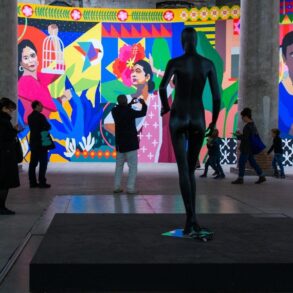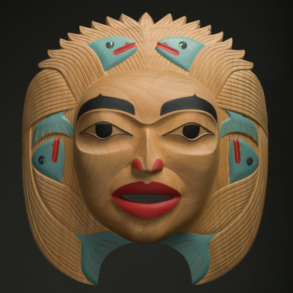“The thing with me is, you’re never going to get an album that sounds homogenous,” says singer/songwriter keshi over a video call from his studio in Texas. “I’m a very proud musician, and I want to be able to showcase that I can make a lot of different types of songs.”
As he alludes, each of keshi’s releases has incorporated something different. “I want fans to expect that something is going to change,” he continues. “Nothing is worse to me than the idea of making an album that sounds like my [previous] one. Things can be familiar, but at the same time, if you want a song that sounds like “Limbo,” just go listen to “Limbo.” I don’t want to make a diet version of any song. That’s boring.”
Keshi brought that desire for change and newness to life on his recently released sophomore album, Requiem. The 13-track project features a daring range of influences — from Queen to city pop — and iterates on his dreamy, soothing sound with enticing layers of electronic music, classic rock, prog leanings, and more.
Born Casey Luong, the Vietnamese-American star developed his passion for music in high school, when he discovered artists like John Mayer and Ed Sheeran. But before realizing that music was his true calling, keshi took a heavy detour, working as an oncology nurse for two years.
The 9-to-5 job at Texas Medical Center left him drained and uninspired. Making music became a welcome, meaningful escape from the grind and, in 2017, he began to craft songs on GarageBand and upload them to Soundcloud. It didn’t take long for online audiences to discover his comforting soundscapes and sensitive lyrics; within two years, keshi had signed a deal with Island Records, quit his nursing job, and immersed himself in his art.
He released his first major label EP, skeletons, in July 2019. The record was part of a trilogy later completed by 2020’s bandaids and always. Approaching themes of loneliness, heartbreak, and yearning, he soon became a lo-fi paragon — a bedroom pop darling ready to get out of bed and take over the world.
His mainstream breakthrough came in 2022, with his debut album, Gabriel. Through 12 tracks, keshi expanded on the usual sadboy vibes by playing with sultry R&B, heated trap, and lush synths. Gabriel reached Top 20 of the Billboard 200, and featured some of his most popular hits, such as “Limbo” and “Somebody.”
After two years of sold-out touring around the globe, the singer stands once again on the threshold of a new era. Requiem was designed for the global arenas that keshi will play during his upcoming Requiem World Tour, a 35-city run that includes stops at New York’s famed Madison Square Garden and Los Angeles’ Kia Forum. “Instead of making music…and reshaping it for live, I would rather make music already intended for the stage,” he says.
GRAMMY.com caught up with keshi to discuss his new album, bargaining with God, selling his soul to the devil, and trusting his team’s decisions.
This interview has been edited for clarity.
You titled your second album Requiem. Who is this requiem for?
This requiem is for a friend of mine who was a collaborator [on my team], who passed away a couple of years ago. I’ve been dealing with that loss — my first experience with loss in general — and I wish I’d known him better than I did.
I didn’t expect his passing to impact me the way that it did, but he was such a big champion of me and my art, and I don’t have that many of them. I didn’t realize how important it was for me. It really changed my perspective on how I view my time, and how I prioritize things. It was so fundamental that I wanted to name the entire album after it.
When did you realize that your friend’s passing was shaping up to be the main theme of your second album?
I started writing songs for my second album when I finished my last tour [in 2023]. I had one album before this one, Gabriel, and I toured Gabriel twice. People were always asking, “Why did you tour two times, even though there was no new music?” The answer is, because, the first time I toured it, we kept it very exclusive and small.
I didn’t want it to [stay] like that. My team and I wanted to make sure that everyone who wanted to see me was going to see me. But when you start out, agencies want to see you fill 1,000 [capacity] rooms first, then 2,000, then 4,000, then 5,000, so we had to do that first run. I was lucky enough that there was so much demand that I did a victory lap. Because I did that, it took two years out of my life, and people have been waiting a very, very long time for new music.
I didn’t want to use any old demos. “Requiem” wasn’t the first [song] we made…. I didn’t think it was going to be the theme for the entire album until I wrote it, but because the feelings in there were so strong and important to me, I decided to name the whole album after it.
The first song in this album, “Amen,” is quite commanding and different from what you usually do, just like the opener for Gabriel, “Get It.”
Yeah, I like having the first song on an album be abrasive, or different. I want people to go into it and just be hooked immediately. But the thing about “Amen” specifically was that I knew that we were going to be doing some really insane venues [for my upcoming tour], and I wanted to walk out to a song that was just gonna go insane with the lights, the band and everything.
Touring for two years really informed how I made [this album]. When we went to tour those first two times, it was kind of tricky changing some songs. This time around, it was very intentional. If you listen to “Amen” and you can imagine being at a concert, that’s the whole goal.
Will it open the concerts?
Yeah, it probably will. There might be some stuff a little bit before it, but I don’t want to spoil too much. But yeah, there’s a lot of bravado and big d— energy in that song. I’m a very proud musician, and I want to be able to showcase that I can make a lot of different types of songs. I don’t want to be pigeonholed into being this kind of artist, or that kind of artist.
And the thing is, I’ve gotten new fans along the way. When I started in 2017, 2018, my music sounded like lo-fi. In 2019, 2020, it sounded like R&B and pop-ish. And in 2022 with Gabriel, It turned into more of an alternative/pop album. I’ve always been changing.
Musically, what inspired you to make Requiem?
I wanted it to feel like a classic, timeless pop album. I took inspiration from rock stars of old, like Queen — you can hear that on the solo on “Euphoria” [and on] “Just to Die.” And I was very inspired by this old folk singer/songwriter — whoever your favorite singer/songwriter is, their favorite singer/songwriter is Nick Drake. He’s so good.
But also, I knew that just the same kind of songs weren’t gonna [make] a compelling live show, that’s why “Amen” was such a great addition. I still love R&B, so that is a really, really important one too. I love classic pop songs, you can hear it on “Say.” I admire city pop, an increased tempo, and a moody sort of cadence, and all that.
Yes, it’s like each song you’re going through a different moment in your life, or a different stage of your grief.
Not the whole album is about mourning, but I will say that my life in the past couple of years has gotten a little bit contentious. Whether it’s with my partner, or whether it’s with my collaborators, or even with my relationship with my art, I wrangled a lot. I think you can feel that drama, that tension. There’s a grandness to the album, but you can definitely feel there’s dissonance on it.
Why do you think that your life has become a little bit contentious?
After so many years doing this [and] being under public scrutiny, it gets kind of hard to deal with. Especially with how long I’ve kept fans waiting, and their demands get higher, and their expectations get higher, and the longer I have them wait, it’s almost like I’ll never meet their expectations. It just gets to a point where it’s unrealistic. Nothing will make them happy.
So, out of a desire to satisfy them and make sure that they get the music that they want, I’ve put a lot of love and care into [this album]. I think the best medicine for me is to have the album be out, and then I can stop being apprehensive and anxious about it. I’m very in my head, it’s stressing me so, so much. [Now that the album is out, I’m] finally free.
Is thinking that your fans might not like your new music a factor that influences your creations?
I don’t think it influences my work; it influences my mental stability. At the end of the day, the art that I make, it’s my responsibility to curate and to give to my fans. I can make all kinds of music, but what’s the music that I like? What does my taste gravitate towards?
I think that’s the responsibility of an artist. So, I’m unabashed; I move forward in the way that I want to, in the kind of music that I want to make, but that doesn’t mean that I don’t worry about expectations. But I have to stay focused so that I can make the best art that I feel like I’m destined to make.
You said in the past that you aren’t religious, but there’s a lot of religious themes in your music, even more so in this album.
I’m not religious, but I think that bargaining with God is… universally human? It’s like you’re bargaining with something greater than yourself, and you sometimes just beg for things, and then other times you’re so prideful that you’re like, I will bend reality to my will.
It’s that sort of tumultuous back-and-forth that I feel has been dictating my life the past couple of years with my dreams and my goals. But what am I willing to trade for, to have those things? How much normalcy in my life am I willing to give away, to achieve the things that I want to achieve?
I don’t ever want to give things away that I can never get back. At the same time, I know that what I have is rare and special, and not many people get these opportunities. It’s like, how do you not sell your soul to the devil in times like this? When you want something so bad, what will you do to achieve it?
Do you think that this album is also a requiem for the person that you were before fame?
That’s actually really beautiful, I didn’t think about it like that. I always thought that “Requiem,” just the song, was my requiem for [my friend], but when I think about it, honestly… wow, the whole album really is like a testament to him. And I think my biggest sadness is that I wish that he could have been here to see how everything that he did helped me blossom. This is my love letter to him, I guess.
In “Texas,” you say that you “should’ve never left it” and reminisce about your past. I guess it relates to this as well?
Absolutely. And also, “Texas” is special because I actually still live here. But when I’m talking about that idea of “I should’ve never left,” it’s the possibility of, Oh, what if I never did this? Would I have been happier, in a different sense?
Sometimes, a part of me thinks that there’s a version of me that doesn’t have any ambition, and sometimes I think that he’s happier than me. That’s kind of what I’m talking about.
You mentioned selling your soul to the devil. What would that be for you?
Oh, that would be… leaving all of my loved ones behind to go have your sort of “idyllic” celebrity life in Los Angeles, [doing] copious amounts of drugs [so] that I can have crazy inspirations to write insane music, and eventually wake up dead on the sidewalk at 33 years old. [Laughs.] That’s romanticized depression and addiction!
I have something very real here in Texas. Everything online, and everything that happens in the limelight, that’s not reality. When you come home after being piss drunk, that’s real life.
What things did you learn from making Gabriel that you didn’t bring to the making of Requiem?
For Gabriel, Elie [Rizk] and I were the producers, and we both work in the same software, which is called Logic. Oftentimes I would be in the producer chair, and he would say, “Get out, it’s my turn.” And then I would get out, and he would sit down, and then I would say, “Get out, it’s my turn.” And we would switch around like that.
This time, we brought our good friend Imad Royal to drive the computer — we call it driving — so he’s the one engineering, tweaking all the knobs and stuff, hitting record, and helping us. It taught me something really special: learning how to let go a bit from being overprotective of things, and listening to what the song needed.
And how was the experience of working with producer j.Que, who has worked with the likes of Britney Spears, Beyoncé and Ariana Grande?
Oh my god, j.Que is so funny. Having j.Que was sort of our compass in the room. He would always be listening, and everybody would be throwing suggestions out in the air, but whenever he spoke, it was full of wisdom, because he’s been in the game for a long time.
If we started to veer off in the song, he would perk up and say, “Nope, you can’t say that. You said this other thing earlier that contradicts you.” It was so much fun, but also contentious. Everyone had their own ideas of what would best serve the song, and… I learned that, if someone was really excited about something, I wanted to figure out why, hear them out, and maybe I could also understand why they were excited.
Why did you choose “Soft Spot” for the lead single?
That was not my decision, actually. They bullied me! [Laughs.]
“Soft Spot” was not my favorite on the album. There’s something about that ’80s kind of song that I’m sensitive about, or I’m cautious about. Because it’s so easy to listen to it and pin it like, It’s that kind of music. That’s why it feels good, because it’s nostalgic, or it uses this, and that. But I’m very proud of the song.
[The song was] sugary sweet, and I just wasn’t really comfortable leaning into it quite as much. But it’s so funny, this is what I mean by putting your hubris aside and understanding when everyone at the label, my producers, and even my best friends are like, “Dude, this song f—s, it’s so good. You should definitely prioritize it.”
If it was by your judgment, what would be the lead single?
I would have chosen “Night,” because it’s so moody and I gravitate towards that kind of music. But I understand why it’s not the song a person is going to listen to and be like, Wow, I want to listen to it over and over again.
It feels more like a world-building song. I think my fans will appreciate the production, how it’s a little bit aggressive. But the goal is to rope in a new audience to combine with my existing one, and I think “Soft Spot” achieves that.
Lastly, how are the preparations for your arena tour going?
Oh, there’s so much work to do. I have to get all these live arrangements done, get all this content made, we have to go to rehearsal, and then production rehearsal, there are so many moving parts.
I’m very grateful to have so many people involved. But also it is kind of daunting — one thing affects the next thing, affects the next thing. I think it’ll pay off once people see it. But for now, my priority is making live versions of everything with my music director, and then we’ll tackle it from there.





